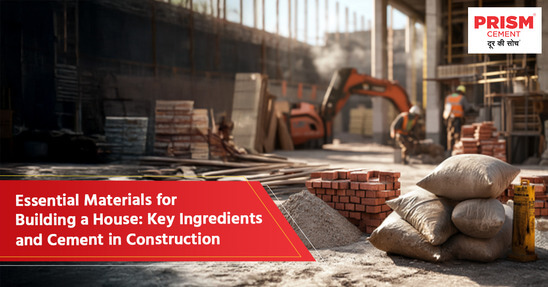
The materials used to build a house play a vital role in its durability, energy efficiency and aesthetic appeal. Selecting the right materials, including key ingredients in construction cement and understanding their impact, is essential for creating a durable, sustainable and cost-effective home.
In this blog, we'll explore the traditional, modern and sustainable building materials used in residential construction, with an emphasis on construction techniques and cement plastering ratio.
Wood:
Brick:
Concrete:
Note: Concrete comprises mainly of cement, that helps enhance strength and durability for foundational applications.
Stone:
Steel:
Glass:
Prefabricated Materials:
Bamboo:
Recycled Materials:
Straw Bales:
The choice of building materials depends on various factors, including budget, lifestyle, and environmental concerns. By carefully considering these factors, including the right cement ingredients and construction techniques, you can select the best materials to create a beautiful, sustainable, and comfortable home.
Remember to consult with a qualified architect or builder to determine the most suitable materials for your specific project, ensuring the main ingredient of cement and appropriate cement plastering ratio are applied for optimal results. We recommend Prism Cement for its wide range of high quality cement products, such as . Prism’s commitment to quality and sustainability ensures that its products deliver exceptional performance and contribute to greener buildings.
Prism Cement a division of Prism Johnson Limited is one of India’s leading integrated Building Materials Company, with a wide range of products from cement, ready-mixed concrete, tiles and bath products.
Prism Johnson Limited is an IMS Certified Company (ISO 9001:2015, ISO 14001:2015, ISO 45001:2018,SA 8000:2014 & ISO 50001:2018). Quality assurance is an integral part of Prism Johnson Limited manufacturing philosophy. The strength and other characteristics are much higher than the BIS requirements. Excellent quality has placed Prism Cement in the premium price segment.
KNOW MORE305, Laxmi Niwas Apartments, Ameerpet,
Hyderabad - 500016, Andhra Pradesh
![]() Tel: +91-40-23400218
Tel: +91-40-23400218
![]() Fax: + 91-40-23402249
Fax: + 91-40-23402249
"Rahejas", Main Avenue, V.P. Road,
Santacruz (W), Mumbai - 400054,
Maharashtra
![]() Tel: +91-40-23400218
Tel: +91-40-23400218
![]() Fax: + 91-40-23402249
Fax: + 91-40-23402249